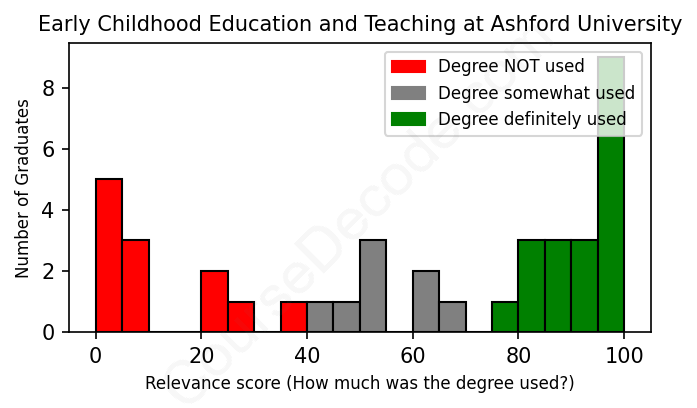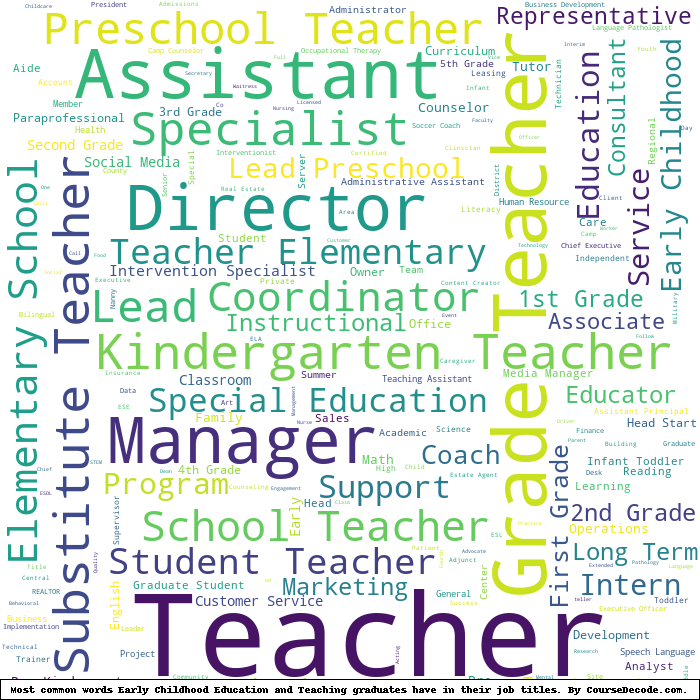
First, some facts. Of the Early Childhood Education and Teaching graduates from Ashford University we've analyzed , here's how many have used (or NOT used) their degree in their career:

These are estimates based on AI analysis of 39 LinkedIn profiles (see below).
The verdict? Below average. Overall, with an average relevance score of 59%, Early Childhood Education and Teaching graduates from Ashford University have a lower likelihood (-8%) of finding work in this field compared to the average graduate across all fields:
And for comparison, here's the chart for all profiles we've looked at across all degrees.
Also, after graduating, only 30% of these graduates have pursued further education other than another Bachelor's degree (such as a Masters degree or other), compared to the average across all profiles of 35%. This suggests a Bachelors degree is enough for most Early Childhood Education and Teaching graduates, and it's normal to look for work straight after graduation.
See the details:
|
Relevance score: 50% We think this person has gone into a career only somewhat relevant to their degree. We think this person has gone into a career only somewhat relevant to their degree.
DEGREE INFOGraduated in 2017 from Ashford University with a Bachelor of Arts (B.A.) in Early Childhood Education and Teaching. No other secondary education since. JOB HISTORY SINCE GRADUATIONCustomer Care Supervisor Spectrum (formerly Time Warner Cable) Apr 2017 - Present ABOUTNo information provided. |
The top 10 most common jobs done by the graduates we've analyzed (ranked most common to least) are:
From analyzing the job paths of individuals who graduated with a degree in Early Childhood Education and Teaching from Ashford University, it’s clear that a significant portion of them have pursued careers related to the field. A lot of graduates ended up in positions such as teachers, early education instructors, and directors at various educational institutions. Roles like Kindergarten Teacher, Senior Child Advocate Manager, and even positions like Head of School and Campus Director show they’ve used their educational background in practical settings. It seems like many of these jobs are directly relevant, aligning closely with the knowledge and skills they gained during their studies.
However, there’s also a noticeable number of graduates who shifted to paths that don’t connect back to early childhood education at all. Some have become business owners, customer service representatives, or have taken on roles in completely different sectors like healthcare or retail. Positions like Customer Service Rep or even Mental Health Technician don't leverage the specialized knowledge gained from the degree. Overall, while a solid group has remained in early childhood education roles, there’s a fair share of graduates venturing into other industries, indicating a mixed relevance of their degrees in their career choices.
Here is a visual representation of the most common words in job titles for Early Childhood Education and Teaching graduates (this is across all Early Childhood Education and Teaching graduates we've analyzed, not just those who went to Ashford University):

It looks like graduates from Ashford University with a degree in Early Childhood Education and Teaching have had a variety of career trajectories, especially in the early childhood education sector. Many of them seem to land jobs that are directly related to their field fairly quickly after graduation. For example, many started off as teachers, teacher assistants, or in administrative roles within daycare centers and educational institutions. This suggests that the degree is relevant and that graduates are finding opportunities in early childhood education right out of school. However, there are also some who ventured off into unrelated fields, like customer service, and even started their own businesses, which indicates a mixed bag of career paths.
Five to ten years down the line, you’ll see a trend where some graduates continue climbing the ranks within education. A number have taken on significant roles, such as directors at educational institutions or specialized teachers in fields like special education. This shows that for those who stay within the education sphere, there's room for growth and advancement. On the flip side, a segment of graduates appears to have shifted away from early childhood education altogether, landing in roles that might not make full use of their degree—like sales or administrative jobs. While many graduates have found fulfilling careers relevant to their studies, it’s clear that there’s also a notable fraction who've taken paths that lead them away from early childhood education altogether. Overall, it seems that the degree opens doors, but the direction taken can vary widely based on personal choices and opportunities that arise after college.
Honestly, a Bachelor’s degree in Early Childhood Education and Teaching can be a mixed bag—it’s not exactly a walk in the park, but it’s also not the most brutal degree out there. At Ashford University, you’ll find that the coursework includes a lot of hands-on stuff, which can be really engaging if you enjoy working with kids. You’ll cover topics like child development, classroom management, and lesson planning, and while some parts may challenge you, especially the theoretical stuff, many students find it manageable if they stay organized and put in the effort. Overall, it tends to be about average in terms of difficulty; just be ready to balance your studies with some creative projects and real-world applications!
Most commonly, in the LinkedIn profiles we've looked at, it takes people 2 years to finish a Bachelor degree in Early Childhood Education and Teaching.
Looking at the job histories of these Ashford University grads, it seems like most of them are in early childhood education, which generally doesn’t pay super high salaries. Some of them have climbed the ladder pretty well, like those who moved into director or management roles, which could definitely boost their earnings. But overall, many still seem to have jobs that likely don’t make bank – teaching positions and similar roles usually come with modest paychecks. A few are running their own businesses or have mixed in side hustles, which might help financially. So, while there are a couple of outliers who might be doing alright, it seems like a lot of them may still be figuring things out financially.
Here is a visual representation of the most common words seen in the "about" section of LinkedIn profiles who have a Bachelor degree in Early Childhood Education and Teaching (this is across all Early Childhood Education and Teaching graduates we've analyzed, not just those who went to Ashford University). This may or may not be useful:

Here are all colleges offering a Bachelor degree in Early Childhood Education and Teaching (ordered by the average relevance score of their Early Childhood Education and Teaching graduates, best to worst) where we have analyzed at least 10 of their graduates:
| College | Score | Count |
|---|---|---|
 Kennesaw State University Kennesaw State University
|
86 | 10 |
 The University of Georgia The University of Georgia
|
81 | 12 |
 Miami University Miami University
|
78 | 16 |
 University of Cincinnati University of Cincinnati
|
77 | 10 |
 Kent State University Kent State University
|
75 | 13 |
 Ashford University Ashford University
|
59 | 39 |